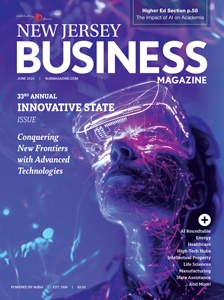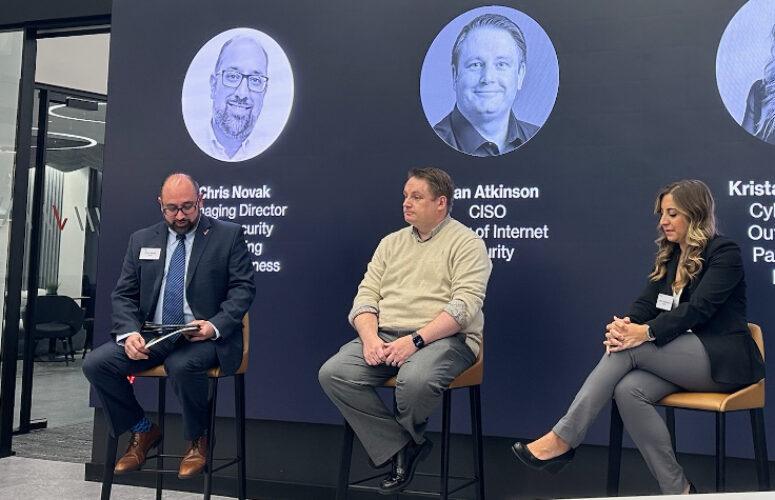
‘We’re in the Wild West of AI’
Offering tremendous potential, but in need of governance and human oversite, businesses are learning how to implement AI.
On Jun 12, 2024Much is being written about artificial intelligence (AI) and how it will revolutionize every aspect of our lives. Businesses large and small are certainly inquiring about the benefits and challenges the technology will deliver. Some companies are taking deep dives into AI now, while others are taking baby steps in its implementation. Below, nine business experts, each from different industries, took part in a recent roundtable discussion with New Jersey Business Magazine Editor-in-Chief Anthony Birritteri and New Jersey Business & Industry President & CEO Michele Siekerka, to discuss their take on AI. Among the many takeaways from the discussion is that the promise of AI is great, but there must be governance of the technology in various sectors, because, as one of our panelists said: “We’re still in the Wild West phase of AI.” Please enjoy the following Q&A and read the bios of our participants alongside this feature.
Roundtable Panelists
Prof. Guiling “Grace” Wang
Dr. Wang, CFA, is the Distinguished Prof. of Computer Science and the Associate Dean for Research at the Ying Wu College of Computing at NJIT. She formed the AI Center for Research at NJIT and played a pivotal role in launching NJIT’s MS in AI program. Prof. Wang sits on the State Supreme Court Committee on AI and the Courts and contributes her expertise to the NJ Governor’s AI Taskforce.
Fred R. Brunetti
Brunetti, a principal at Porzio, Bromberg & Newman, P.C., is a commercial litigator with experience representing corporate clients in complex disputes, covering a diverse range of practice areas. Combining his litigation experience with knowledge of privacy laws and best practices, he advises clients on privacy issues relating to the collection of personal information, data management, and more.
John Holub
As president and CEO of the NJ Retail Merchants Association, exec. dir. of the NJ Council of Chain Drug Stores, president of the Pennsylvania Retailers’ Association, and senior principal at Cozen O’Connor Public Strategies, Holub brings more than two decades of experience in advocacy and campaign management to his work, advising on behalf of retail, pharmacy, chain restaurants, and other industry clients.
Sameer Sethi
As chief data and analytics officer at Hackensack Meridian Health, Sethi is an expert in healthcare data and analytics with a track record of enabling use of data and analytical techniques. He has focused his career on data, technology, and innovation for healthcare providers. Sethi and his team are accelerating the use of AI and Machine Learning to deliver quality, affordable, and efficient healthcare.
Krish Swamy
Swamy is chief data and analytics officer at Citizens Financial Group, where he is responsible for building a robust data environment at the institution. Prior to that, he was the head of the enterprise analytics and data science group at Wells Fargo, where he led the analytics and data science/machine learning teams that were responsible for supporting transformation initiatives across strategic functions.
Israel Tannenbaum
Tannenbaum, a partner at CPA firm Withum, has more than 20 years of experience providing value-add compliance and tax consulting services to not-for-profit clients. He is an expert in Unrelated Business Income Tax (UBIT) and foreign filing requirements for tax-exempt entities. He also has experience in providing Employee Benefits Tax compliance and consulting services to a diverse group of clients.
Drew Thompson
Thompson, a founding partner of Consult Drew, LLC, is a business coach who leverages the power of generative AI to help leaders and their teams unlock new levels of creativity and results. His approach is focused on harnessing advanced technology to help clients set and achieve their goals. He combines creative marketing with AI so clients can move faster and accomplish more.
Douglas Vargo
Vargo, vice president, emerging technologies practice lead, CGI, helps clients digitally transform their organizations and re-imagine new ways of accelerating growth. He believes that the ability to introduce and scale emerging technologies is the keystone building block of innovation. He and his team teach entrepreneurs how to harness generative AI so they can unlock creativity, efficiency and work smarter.
Is AI a game changer for businesses?
Prof. Wang, NJIT: AI is a transformative force across the business landscape, similar to the impact of the spinning genny or the steam engine during the industrial revolution. These innovations dramatically increased productivity and efficiency. AI promises to do the same. However, just as the industrial revolution brought about significant societal shifts and challenges alongside advancement, AI too presents its own set of issues that require careful navigation.
What efficiencies will AI deliver?
Tannenbaum, Withum: We’re heavily pushing, exploring and implementing [AI] at Withum to see where we can find efficiencies, but at the same time, we’re taking a balanced approach just to make sure we do it the right way. However, this is the forefront. If you’re not staying in front of it, you’re getting left behind.
That said, I see internal and external efficiencies. I’m in the accounting industry. When you talk about auditing, for example, it’s about sampling [data]. If you have AI doing that, it could in theory look at 100% of your information in a very short amount of time.
However, we’re still in the Wild West phase [of AI]. So, it’s important to do things with a thoughtful approach to make sure that you’re not going too hard, too fast, putting too much information out there [without] understanding what the consequences are.
Swamy, Citizens Bank: What is interesting is the whole new thrust with generative AI. It has made it possible to easily get value out of unstructured data. When we use traditional machine learning techniques, the data has to be in a certain format. However, a lot of the data that exists in the world is human generated data and that, by definition, is messy and not very organized. What [AI] tools have been able to do is open the opportunity for us to start to use some of the non-structured data for day-to-day tasks.
Vargo, CGI: Businesses need a solid fundamental AI policy, and it’s important that we don’t forget the core fundamental aspects of data management: stewardship and governance. As you start to rely on data within your organization, it’s pivotal that it’s in good shape. As we start to get into the generative AI piece of it, we’re now bringing in more third-party aspects. We need to have policies around responsible usage [of that], the transparency of results, and the transparency of large language models. … All these governance pieces are going to be pivotal for an organization to survive.
Sethi, Hackensack Meridian: We see the use of AI in three different ways. One is clinical decision and operational decision support. The second piece of this is efficiency. The third piece is around improving the patient experience; this being front-facing AI. We are starting to think about capabilities by which we can educate our patients better, help them decide – obviously with the help of their physicians – on what level and type of care is best for them.
Can you dig deeper into clinical decision uses?
Sethi, Hackensack Meridian: Where we have seen the largest impact is around disease detection. Physicians are trained to detect or look for conditions within a patient’s record or the patient [himself who] either shows signs of a disease or the potential for a disease. AI has been helpful in detecting the disease sooner than when a physician would find it.
One example would be end of life care. This leads to some controversies. We predict death in patients who are going through diseases that are chronic in nature. The reason we do this is to help our physicians and families decide whether end of life care is something that they should consider. As you know, physicians can get very passionate about [helping] the patient. What AI [points out] are certain indicators – and we look at almost a hundred indicators in the patient record – that shows the provider that perhaps [the patient] should start looking at hospice or palliative care as an option versus continued care through medicine and other therapies.
Holub, Retail Merchants Association: A lot of retailers are embracing AI and implementing it in several ways, the quickest of which is on the supply chain side of things; doing forecasting and understanding consumer demand. Some [retailers] have [robots] in their stores [scanning] shelves and doing instant inventory and things like that. Then there is improving the customer experience. People may not realize that they’ve been using AI for a while with [online shopping] and algorithms telling them, for example, to consider [buying related] products. All these recommendations are AI driven.
Brunetti, Porzio Bromberg: We are seeing a lot [of AI being used in] to support internal procedures such as meeting scheduling, internal communications, and things that have a lot to do with tasks that could be shrunk from a labor and time perspective. For outward-facing, client-based issues, we’re still in the birthing stages here. However, we are seeing some progress on the guidelines front, where bar associations and taskforces, especially in New York and New Jersey, are starting to give general parameters of how AI should be used correctly.
From the services end, which is direct client interaction, the use of AI technology needs to be closely supervised. It always needs to have human monitoring and a human touch to it.
Prof. Wang, how are you teaching AI to NJIT students?
Prof. Wang, NJIT: The advent of large language models such as ChatGPT is reshaping the educational landscape across disciplines, but notably between STEM and the social sciences or writing-focused courses.
In the STEM field, I encourage students to utilize ChatGPT as an educational tool. ChatGPT can aid in many tasks such as generating code. The key lesson is to skillfully craft prompts and then critically evaluate AI’s responses.
The scenario shifts in social science and writing classrooms. Here, the essence of learning revolves around developing original thought. So, it’s critical analysis and the understanding of human experiences. These are the areas in which AI’s role is more contentious.
It’s crucial for educators to establish clear guidelines on how a large language model like ChatGPT can be used responsibly. This might involve setting boundaries around direct AI-generated content assignments or encouraging a reflective approach where students critically engage with and assess the information provided by AI.
How will AI impact jobs?
Thompson, Consult Drew: It is going to impact staffing levels in significant ways. You’re going to see things like accounts payable and accounts receivable [functions] done faster and with more efficiency and accuracy. Sam Altman, CEO of OpenAI, said that GPT-4 and GPT-5 could take over knowledge work; for example, marketing and accounting, et cetera. So, what we must do is retrain our employees to think about AI first.
Are businesses ready for that?
Vargo, CGI: Not yet, but you must start educating your workforce on the use and applicability of these technologies as part of their daily lives. I like the saying that AI will not take your job, but someone who knows AI will take your job. I agree with Drew that, over a longer period, we’re going to see a dramatic shift in the skills of people who are needed. Developers that we’re using today will be a thing of the past in the next 10 years because of natural language capabilities. People will be able to ask AI models to create something. That will drive overall transformation.
Is AI moving businesses away from personal interactions?
Brunetti, Porzio Bromberg: I don’t think there will ever be a time, at least in the legal profession, where you’re not going to have that interpersonal type of relationship. When you go to legal counsel to try to find your way through a challenging legal problem, you’re going to want that interpersonal reaction, that interpersonal empathy, that interpersonal thought process.
[AI could be use for] the backroom issues to make sure that your opinions, thoughts, and research are the best supported and analyzed. All that continues to happen with human monitoring and human supervision. But clients increasingly will want to go to an attorney who’s going to provide the best, most efficient, accurate legal services. That’s going to be enabled by … leveraging the best AI tools and making that interpersonal connection.
Prof. Wang, NJIT: The key is to manage the balance in recognizing that AI and the human agents have complementary strengths. AI can handle routine inquiries which frees human agents to address more complex issues and provide the empathy, understanding, or communication that AI currently cannot. This hybrid approach can enhance overall customer service by ensuring that while all customers receive prompt and accurate service, those needing personal interaction can still find it.
To handle the potential depersonalization brought on by AI, I believe we can invest in AI systems that are not just technically proficient, but also designed with an understanding of human psychology. Such a system should be able to identify when a customer’s needs would be better served by a human agent and facilitate a seamless handover.
To access more business news, visit NJB News Now.
Related Articles:





